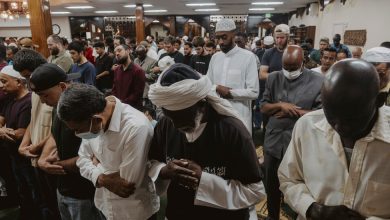In Ukraine War, a Long Journey Begins in Prosecuting Rape

The rape happened in the hours after midnight on March 14, in a classroom of a school outside Kharkiv, in eastern Ukraine. Two days later, Yulia Gorbunova interviewed the victim and helped persuade her to report the attack, which could ultimately be prosecuted as a war crime committed by invading Russian forces.
Ms. Gorbunova, an investigator with Human Rights Watch, spoke with the victim several more times by phone and later in person to document her trauma and obtain photos of bruises and cuts that the woman said had been inflicted by a Russian soldier who had raped her repeatedly. The victim — mother to a 5-year-old daughter — submitted at least some of the evidence to local authorities in Kharkiv.
But this week, Ms. Gorbunova also brought the attack to the attention of Ukrainian war crimes prosecutors in Kyiv, the capital.
“They were very interested, because they said that it has been difficult to get survivors of sexual violence to come forward,” Ms. Gorbunova said in a telephone interview from Kyiv on Wednesday. She has been documenting human rights abuses in Ukraine since 2014, when Russia began supporting separatists in the eastern part of the country, and was alerted to the rape near Kharkiv by local activists.
She added: “I am not aware of any successful prosecution of cases of rape in the context of armed conflict, specifically in Ukraine.”
In the first two weeks of April, about 400 cases of sexual violence by Russian soldiers were reported to Ukraine’s ombudswoman for human rights, Lyudmyla Denisova. A U.N. mission has received at least 75 allegations of sexual violence against Ukrainians, including children, by Russian troops in Kyiv alone since Feb. 24, the start of Moscow’s invasion.
In coming days, senior U.N. officials and investigators will rush more resources to authorities in Ukraine to help prosecute sex crimes. But most rape victims never report their assault, fearful of retaliation and societal stigma. Finding clear evidence that sex crimes were committed as a tactic of war is rare, and cases are difficult to prove.
It could be years before charges are brought or trials are convened by the International Criminal Court in The Hague, which is investigating sex crimes by Russian soldiers and other atrocities committed in Ukraine since 2014.
“I can’t promise anything — I’m a prosecutor,” Karim Khan, who is heading the court’s investigation, said at an event on Tuesday at the U.S. Institute of Peace in Washington when asked about the likelihood of swift or conclusive justice for victims of sex crimes or gender-based violence in Ukraine.
“All I can promise is ethics, hard work, integrity, following the evidence and trying to use imaginative and creative ways to ensure that justice is not a phantom,” Mr. Khan said. The I.C.C., he said, is “a court of last resort.”
With that in mind, U.N. officials are looking for other ways to ensure that sex crimes do not go unpunished.
Six U.N. investigators with expertise in documenting gender-based attacks as potential crimes of war will soon join an international monitoring team in Ukraine, said Pramila Patten, the United Nations’ top official on sexual violence in conflict. They are part of a broader effort to not only help verify reports of sex crimes but also train Ukraine’s overwhelmed prosecutors to properly preserve evidence that is gathered, and to protect victims from further trauma during questioning.
“Today’s verification, today’s documentation is really tomorrow’s prosecution,” Ms. Patten said in an interview.
She added: “It is important that the Ukrainian authorities responsible for investigating get it right, in terms of ensuring that they do no harm; that they do not victimize the victims.”
The U.N. assistance is part of an agreement with the government in Kyiv that Ms. Patten said would be formally announced next week to hasten prosecutions by Ukraine courts — what officials believe is the quickest path to a trial in the war’s sexual assault cases.
The U.N. has not verified any of the reports of rape or other gender-based violence by Russian soldiers since the invasion. But, Ms. Patten said, “I cannot wait for verification to be completed to take action on reported cases, because for me, denying, downplaying, procrastinating or dismissing such serious allegation is the surest sign of the risk being repeated.”
She is appealing to other countries that are party to the international court to consider opening their own prosecutions into allegations of Russia’s sex crimes by claiming universal jurisdiction — the legal principle that some violations are so odious they are an affront to humanity at large, and therefore can be tried by any nation’s court system. Earlier this year, a German court convicted a Syrian intelligence officer of crimes against humanity, and sentenced him to life in prison, for overseeing a security center in Damascus where detainees were tortured, raped and otherwise abused.
The United States is not a party to the international court in The Hague and cannot prosecute abuse cases in American courts without a referral from the U.N. Security Council, which Russia would almost certainly veto.
Russia-Ukraine War: Key Developments
Deterrence and aid. Britain’s military said it would deploy 8,000 soldiers to Europe to join troops from other NATO countries in exercises meant to deter further Russian aggression. The announcement follows President Biden’s request to Congress for $33 billion to bolster Ukraine.
On the ground. After a period of relative quiet, Russian rockets slammed into Kyiv, the capital of Ukraine. The barrage hit an empty weapons factory and a nearby apartment building, and Kyiv’s mayor said one person was found dead under the rubble.
NATO guarantees. NATO is exploring ways to defend Finland and Sweden should they ask to join the alliance, even in the period before their membership is ratified. As fears mount that the conflict might spill over the borders of Ukraine, the two countries have been moving toward requesting membership.
Gas supplies. After Russia cut off natural gas supplies to Poland and Bulgaria, the German chancellor, Olaf Scholz, said that his country must be prepared for the possibility that Germany could be next. Mr. Scholz has warned that a quick cutoff could throw the economy into a recession.
As a permanent member of the Security Council, Moscow could also veto efforts to impose international sanctions against Russian individuals or organizations believed to have carried out sex crimes or violence against women in Ukraine. Ms. Patten said economic penalties issued in recent years against officials who targeted female activists in Yemen, or failed to stop sexual abuse of detainees in Libya, have served as a warning to deter gender-based violence elsewhere.
An annual report released by Ms. Patten’s office this month concluded that U.N. investigators had verified nearly 3,300 cases of conflict-related sexual violence worldwide in 2021 — an increase of about 800 cases from the year before.
“If this sexual violence is happening on the scale that it is happening, with the brutality and the fact that justice remains painfully slow, it’s not for lack of a normative framework,” Ms. Patten said. “It’s because there is no political will” to stop or at least punish it, she said.
In Ukraine, much of the evidence compiled so far in sexual assault cases has been collected by investigators for nongovernment organizations, like Ms. Gorbunova, or journalists. Many victims who have reported their assaults have done so anonymously, Ms. Patten said, refusing to identify themselves in phone calls to government hotlines.
The Russian authorities have denied all responsibility for civilian killings, abuse and other atrocities in Ukraine since the invasion, and President Vladimir V. Putin has denounced evidence to the contrary as “fake.”
In the rape outside Kharkiv, Ms. Gorbunova said it was not yet clear if the attack would rise to the level of a war crime, or if it was a case of one soldier’s depravity.
The man held the woman captive at gunpoint in a cold classroom overnight while her daughter remained in the school’s basement with relatives. After procuring some cigarettes, he left around dawn. The woman then walked to Kharkiv to get medical help.
Ms. Gorbunova was alerted to the case within hours and first spoke to the victim on March 16. They met weeks later, in early April, in Poland, where the woman, whom Ms. Gorbunova has not identified by name, was seeking medical assistance and counseling.
“We’re trying to understand the scale of this abuse, and we are trying to understand whether it’s being used as a weapon of war,” Ms. Gorbunova said.
“Having said that, it sometimes can take a very long time — years — for survivors of sexual violence to come forward,” she said. “And you know, the case that I documented — I know that this woman has been incredibly traumatized. And all she wants to do now is to move on.”





